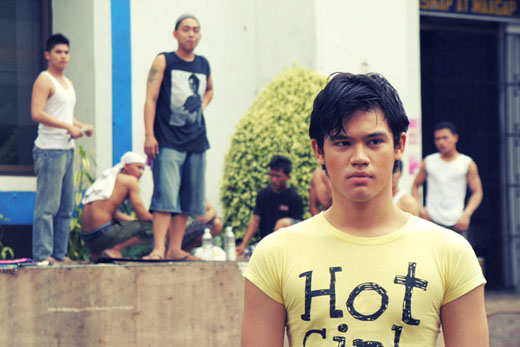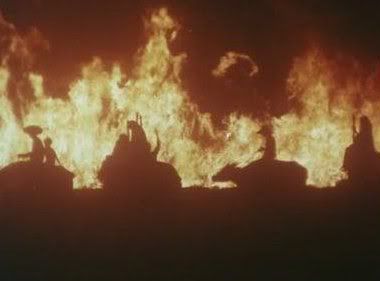 Resonant.
Resonant.It took me a long time to get my hands (and eyes) on this film that has gained much more attention after it was remade by this fairly obscure director named Martin Scorsese as that little film called "The Departed". And finally, after seeing "Infernal Affairs" for the very first time, there clearly isn't any doubt why such legendary filmmaker would be too fascinated by it that it has inspired him to re-imagine it into a solid Oscar winner.
Of course, suffice it to say that "The Departed" is the better overall film from the screenplay up to the raw performances (although "Infernal Affairs'" solidly ethereal cinematography takes the cake for me), but this film introduces how Asian cinema, as a whole, can accelerate into higher degrees of narrative sophistication and more complex characters without the usual jumps, kicks, and overly stylish gun ballets.
While I'm watching the film, there's the common bias circling within my head as a result of watching a remake and an original in the wrong order. Some scenes seem simplified, a few subplots looking quite underdeveloped and a hefty lot of melodramatic injections that have filled up more than the film can contain. At times, with the choruses of sentimental musical scores, there's this feeling that I'm watching a John Woo film with Woo being on a set piece-sized lazy fit (due to the lack of literal action, that is).
But then there attacks the film's hard-hitting Shakesperean (by way of how it can transcend time boundaries) plotline that is truly powerful and tragic as it is timeless. Really, you can put the film's story into whatever historical timeline and its tensely emotional grip won't get any weaker. Two people on the opposite ends of an equally sharp double-blade. Two goals of two contrasting characters running and functioning on fragile moral codes. This is Lau and Yan (played by Andy Lau and Tony Leung Chiu Wai with equally silent intensity and incendiary emotions), trapped in ordeals that are choices of their own.
The film may look like your usual cat-and-mouse-type crime thriller but "Infernal Affairs" also appeals in an existential and almost spiritual kind of way that seem to form a lyrical discourse about self-preservation and destiny in the middle of a casualty-laden chess match between the mob and the police force. Like Woo's "The Killer" or even Michael Mann's "Heat", the film perfectly contrasts a couple of isolated characters and filters them through a dramatic lens before putting them into a crucially consequential collision.
"Infernal Affairs" is also wise and articulate enough to put thematic issues such as split ideals, torn loyalties and true selves into a subtle parallelism in the form of Lau's girlfriend's novel about a man with 29 identities. More than ever, thinking once again of "The Departed", I eternally hate Matt Damon's scheming Colin Sullivan (the remake's Lau). Immediately, I assumed the same for Andy Lau's character. I even thought Lau's brilliant facial expressions that show tension, deceit and conceit in different magnitudes of situations evoke an enveloping sense of disdain more than Damon does.
But seeing how the film's events unfold, I see Lau more as a tragically-fated character that merely found himself on the wrong end of the 'black and white' moral spectrum. And deeper and deeper I delve into the film's almost mythical deconstruction of the usual moral 'black and whites', the more I realize how "The Departed's" informant twist regarding Jack Nicholson's character (the remake's crime boss equivalent) was really uncalled for.
But then, both are different films, but there's really something about "Infernal Affairs'" picturesque choice of locations that seem to enhance the story's atmosphere at a distinctly unique level that not even the mean streets of Boston can match.
For me, the produced sequels to this film were completely unnecessary. For once, "Infernal Affairs" is a stand-alone moral fable more than it is an immediate thriller film. It's a deeply human film more than it is about the exploits of despicable gangsters and game-face police officers. And finally, it's a character-driven picture more than it is a twisty little police procedural.
Hypothetically speaking, if I'm a video store clerk and you would ask me which section I'll put "Infernal Affairs" into, I'll gladly put it in the 'drama' section any day of the week.
Of course, suffice it to say that "The Departed" is the better overall film from the screenplay up to the raw performances (although "Infernal Affairs'" solidly ethereal cinematography takes the cake for me), but this film introduces how Asian cinema, as a whole, can accelerate into higher degrees of narrative sophistication and more complex characters without the usual jumps, kicks, and overly stylish gun ballets.
While I'm watching the film, there's the common bias circling within my head as a result of watching a remake and an original in the wrong order. Some scenes seem simplified, a few subplots looking quite underdeveloped and a hefty lot of melodramatic injections that have filled up more than the film can contain. At times, with the choruses of sentimental musical scores, there's this feeling that I'm watching a John Woo film with Woo being on a set piece-sized lazy fit (due to the lack of literal action, that is).
But then there attacks the film's hard-hitting Shakesperean (by way of how it can transcend time boundaries) plotline that is truly powerful and tragic as it is timeless. Really, you can put the film's story into whatever historical timeline and its tensely emotional grip won't get any weaker. Two people on the opposite ends of an equally sharp double-blade. Two goals of two contrasting characters running and functioning on fragile moral codes. This is Lau and Yan (played by Andy Lau and Tony Leung Chiu Wai with equally silent intensity and incendiary emotions), trapped in ordeals that are choices of their own.
The film may look like your usual cat-and-mouse-type crime thriller but "Infernal Affairs" also appeals in an existential and almost spiritual kind of way that seem to form a lyrical discourse about self-preservation and destiny in the middle of a casualty-laden chess match between the mob and the police force. Like Woo's "The Killer" or even Michael Mann's "Heat", the film perfectly contrasts a couple of isolated characters and filters them through a dramatic lens before putting them into a crucially consequential collision.
"Infernal Affairs" is also wise and articulate enough to put thematic issues such as split ideals, torn loyalties and true selves into a subtle parallelism in the form of Lau's girlfriend's novel about a man with 29 identities. More than ever, thinking once again of "The Departed", I eternally hate Matt Damon's scheming Colin Sullivan (the remake's Lau). Immediately, I assumed the same for Andy Lau's character. I even thought Lau's brilliant facial expressions that show tension, deceit and conceit in different magnitudes of situations evoke an enveloping sense of disdain more than Damon does.
But seeing how the film's events unfold, I see Lau more as a tragically-fated character that merely found himself on the wrong end of the 'black and white' moral spectrum. And deeper and deeper I delve into the film's almost mythical deconstruction of the usual moral 'black and whites', the more I realize how "The Departed's" informant twist regarding Jack Nicholson's character (the remake's crime boss equivalent) was really uncalled for.
But then, both are different films, but there's really something about "Infernal Affairs'" picturesque choice of locations that seem to enhance the story's atmosphere at a distinctly unique level that not even the mean streets of Boston can match.
For me, the produced sequels to this film were completely unnecessary. For once, "Infernal Affairs" is a stand-alone moral fable more than it is an immediate thriller film. It's a deeply human film more than it is about the exploits of despicable gangsters and game-face police officers. And finally, it's a character-driven picture more than it is a twisty little police procedural.
Hypothetically speaking, if I'm a video store clerk and you would ask me which section I'll put "Infernal Affairs" into, I'll gladly put it in the 'drama' section any day of the week.










